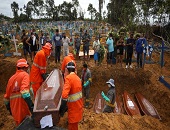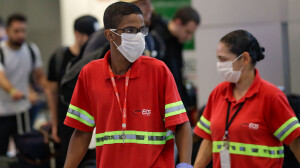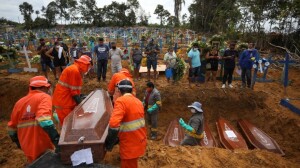How are different parts of the world reacting to the Covid-19 Pandemic, and how does that affect those who must analyze and report on global geopolitical risk?
The magazine The Economist presented a webinar on May 28, 2020, titled “Inside Story: Reporting on the Covid-19 Pandemic Around the World.” Helen Joyce, executive editor for events at The Economist, interviewed two outstanding foreign correspondents. This is part two of a two-part summary.
The second panellist was Sarah Maslin, foreign correspondent for The Economist, South America. She spoke from her home in São Paulo, which is decorated with scarves from soccer teams in Sheffield and El Salvador. She said the pandemic has not been taken seriously by President Jair Bolsonaro, who calls it “a little flu,” while his supporters continue to hold big rallies and protest. “This goes counter to his own minister of public health,” Maslin noted.
“Brazil has a lot of strengths, such as a universal health care system … that handled Zika virus and the H1N1 swine flu pandemic” but this time the country is suffering from mixed messaging. “People are out and about, and the police are not enforcing lock down.”
Even before the pandemic, Brazil was a challenge to cover. “It’s like several countries rolled into one.” The president speaks openly with contempt against “elite left-wing” journalists, and tensions are so bad journalists are sometimes injured by supporters during press conferences.
Although Maslin cannot travel to distant locations, she has a broad network of contacts who give constant input on breaking news. She will even request interviews from staff as they leave their shifts working at overwhelmed hospitals. She especially does not want to travel in person to remote Indigenous communities and potentially transmit the virus.
Maslin said there is a “slow-moving political crisis” in the works, especially with recent investigations into Bolsonaro’s sons. “One week, the news is Covid, the next week it’s the justice ministry.” There appears to be 25 to 30 percent of voters who support Bolsonaro, and they take to the streets every week with car rallies.
In Brazil, there is no public campaign to encourage people to stay home. Big businesses, such as banks, are putting out lots of responsible public message regarding the pandemic. Small businesses proclaim support for the president.
Bolsonaro recently fired the director of police. His supporters are calling for the supreme court to be shut down. Perhaps there is risk of a military coup.
Other parts of South America show unrest, she said. For example, in Bolivia, the political system is very polarized, with new legislation recently enacted “against anything endangering public health” – which could have a worryingly large scope.
Once travel restrictions ease up, Maslin said she wants to visit the Amazon rainforest, which is starting to dry out and suffer from all the illegal mining and logging activity. “Climate change is the news that keeps getting pushed aside,” she said, so it’s important to turn our focus back to it once the pandemic is over. ♠️
The image of health workers in Brazil is from Bloomberg.com
The image of the mass grave in the Amazon region is from CBC.ca



